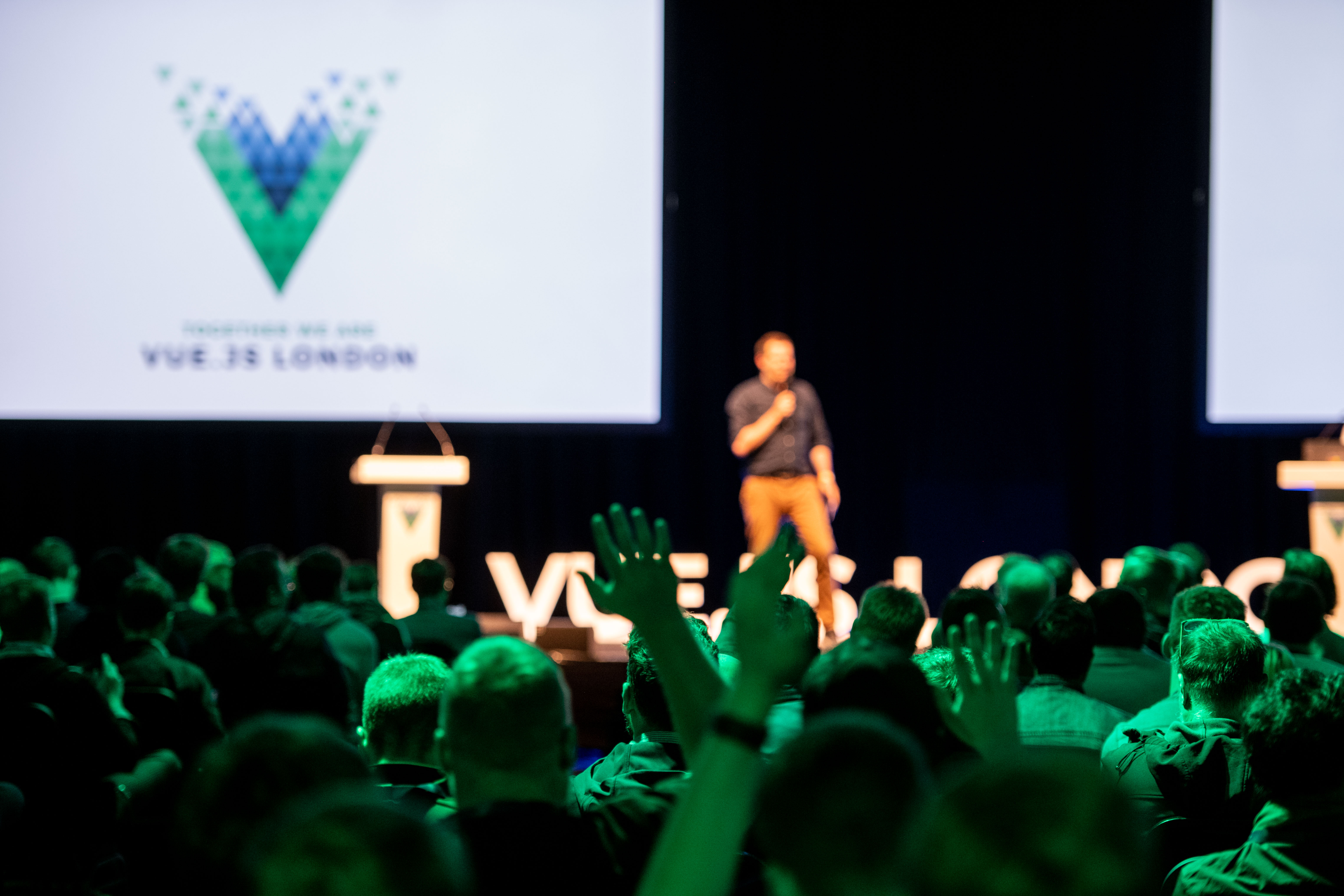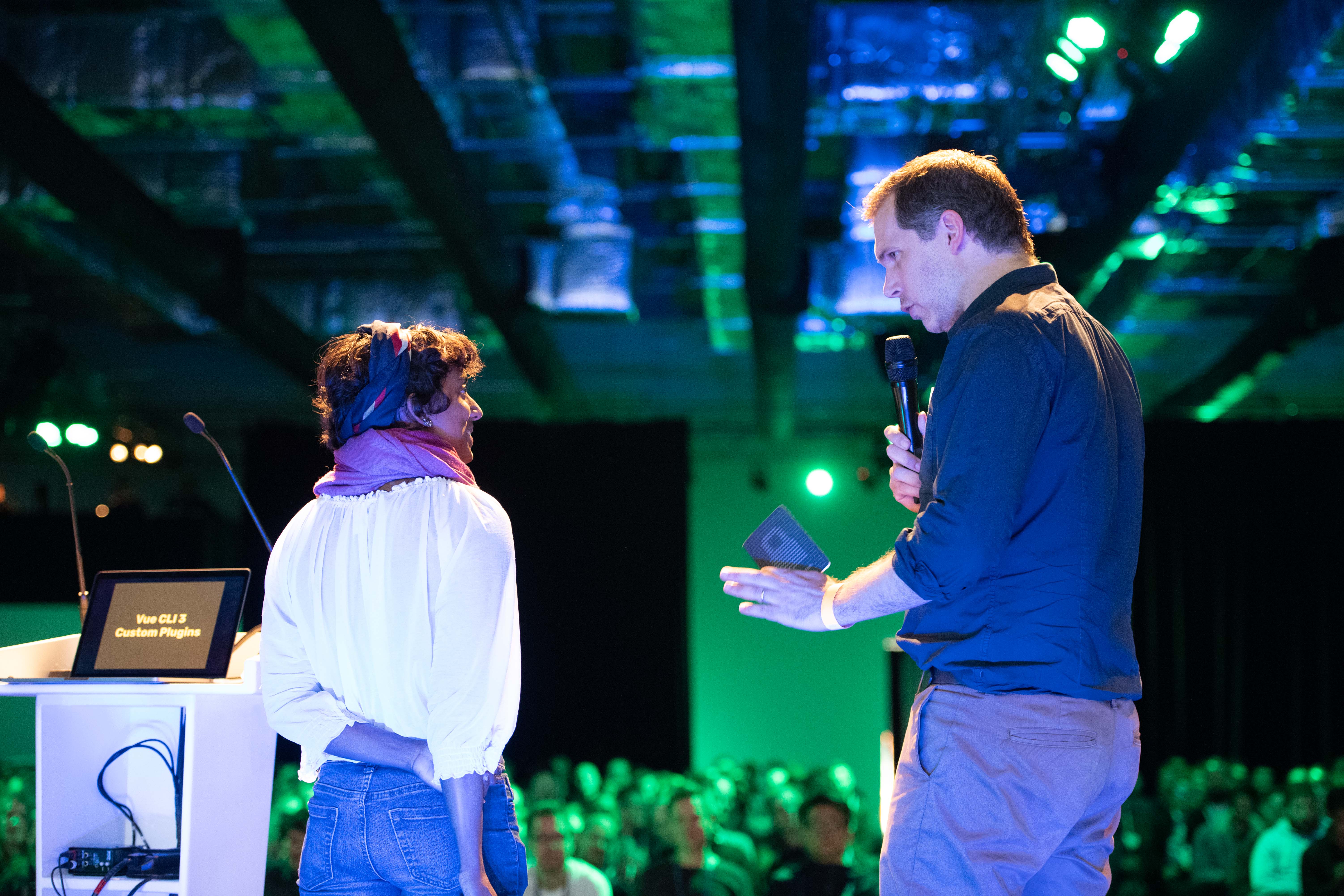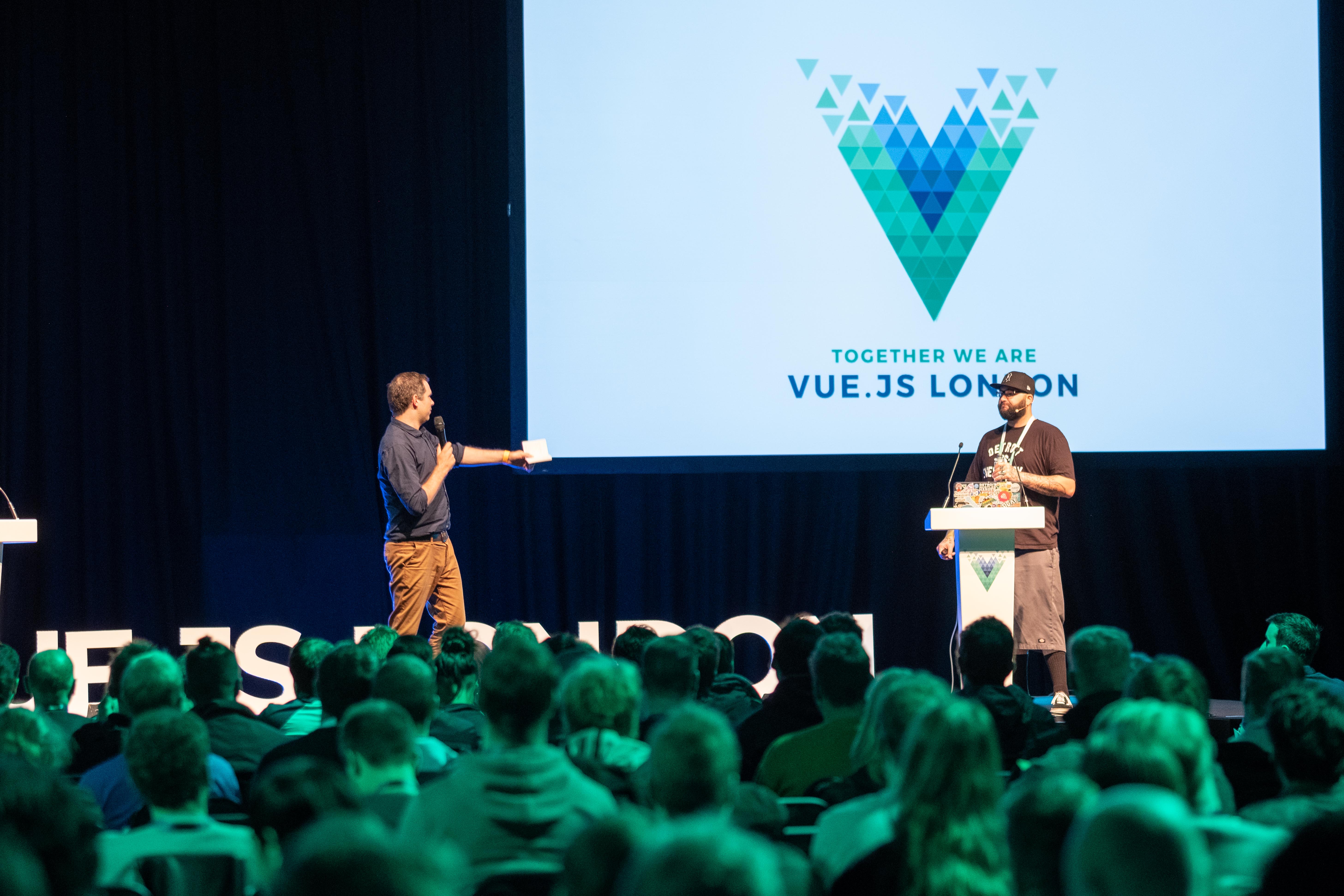Emcee Tips for a Conference or Meetup
Publikováno: 21.11.2019
There are some great resources out there to help conference speakers give better talks, but fewer for people who are preparing to take on the role of emcee at meetup or conference.
I've been fortunate enough to emcee conferences more than 20 times now, most recently JAMstack_conf which I help organize. I also enjoy hosting smaller, less formal meetups which benefit just as much from having somebody to keep things rolling nicely along.
Since emcee-ing is a rather visible … Read article
The post Emcee Tips for a Conference or Meetup appeared first on CSS-Tricks.
There are some great resources out there to help conference speakers give better talks, but fewer for people who are preparing to take on the role of emcee at meetup or conference.
I've been fortunate enough to emcee conferences more than 20 times now, most recently JAMstack_conf which I help organize. I also enjoy hosting smaller, less formal meetups which benefit just as much from having somebody to keep things rolling nicely along.
Since emcee-ing is a rather visible role, I often get asked, "Got any tips for emcee-ing?" I do. At the same time, note that there is no substitute for finding the approach that fits you and lets you be yourself. But I've found what works for me, and what I enjoy in an emcee when I'm attending or speaking at a conference.
Here's my advice:
Biggest tip: Enjoy yourself.
I find that trying to relax (yeah, easy to say) and remembering that the audience want you to succeed really helps. When you remember that you're not hosting the Oscars (if you are reading this in preparation for hosting the Oscars, please contact me directly. DMs are open), and that people are very happy with you being human and personable, it gives you license to relax and talk to the room as if everyone is your friend. That’s liberating and helps you to be more natural.

To err is human
While we all want things to run as smoothly as possible, mistakes happen. Don’t panic or let them throw you off too much. I find that owning mistakes and communicating them honestly to the audience can be a feature rather than a bug. It also helps them trust you and be on your side. (I believe that there is only one “side” at a conference anyway. And this can help to establish that.)
Many of the moments I consider highlights have come from some silly mistake I’ve made on stage, like giving the wrong information and being corrected by the audience. It’s fine. We’re in it together. Have a little fun with it.
Technical difficulties
It’s really common for there to be technical difficulties during a conference. They often only take a few moments to resolve, but they can occasionally drag on and become a little uncomfortable.
As a speaker it is horrible to think that you are on your own to fix things while a room full of people impatiently watches on. As an emcee, you can help enormously by being ready to jump in if it looks like things might need some time and concentration from the speaker, or if a helpful member of the audio-visual team is sprinting to the stage.
I like to step back on the stage to provide a little buffer. No need to panic. Often just a little company on stage and some headspace is all that is required. My trick is to keep a little pocket-sized notebook on me all day. I keep a few notes ready, things like news and announcements for the audience. Where will the refreshments be later? Who are the sponsors and where can you find them? What are the details for the social later on? Those kinds of things. You may need them at the start of the next break anyway, but you can buy a little time for the speakers and save time for later by being ready to share that at this "handy opportunity."
“Me again! We’ll get this fixed in a second. While we have a mo...”
Even when there isn’t a problem, the speaker might still take a little time to plug in their laptop, be certain that they can see their speaker notes, and so on. If the conference does need each speaker to plug in as they come to the stage, I like to invite them up while I introduce them, and then check that they are ready when it looks like they have stopped tinkering with their setup. This doesn’t need to be a secret from the audience. “It looks like Jina is ready to go. Are you all set? Excellent! OK, a big round of applause please, for...”
Longer pauses. Oh this is getting awwwwwkward!
Every once in a while, there is a larger technical issue. The audio-visual team is on it, but you’ve used up all your padding material, pulled a couple of jokes from your back pocket, and now you and the speaker are stranded on stage with nothing to say and that horrible feeling of not knowing where to put your hands so that you look natural. Not to worry. Be honest.
Eventually the audience will start to feel awkward too, so cut this off at the pass. If things look like they really do need a few minutes, tell the audience. A bright and breezy update buys you some time and some good will.
"It looks like we still need a couple more minutes to figure this out, so we’ll step off stage for a moment and then come on again to enjoy a second, bonus round of applause. Don’t go anywhere, we’ll be right back!"
This sort of thing can take the pressure off everyone. Including the audience. And you can milk that second round of applause for the speaker as they return.
Just be honest. Everyone is on your side, remember.
Practice all the names
A mistake that makes me uncomfortable is botching somebody's name when I introduce them. That is a bit of a fear I still have and I've done it many times despite my best efforts. I like to watch YouTube videos of all the speakers that I don't already know to get a sense of what they've spoken about in the past, and also as a chance to listen to how they introduce themselves. I practice them out loud and write them down phonetically if they are tricky.
If you find a name particularly difficult, you can even use the voice recorder on your phone to capture how they pronounce it on YouTube, or your own best try, and then have it ready as a last-minute primer just before you need it.
Know more than the speaker's bio
Speakers often get introduced by someone reading out their bio. I don't think this gives the impression that you have enthusiasm for, or awareness of them. Both of which are, I think, valuable for creating trust with the audience and comfort for the speaker. I like to look them up and make some notes based on previous talks, the links on their own sites, or whatever else I can scrounge. I like to have an intro that goes beyond the bio that the attendees all have and will recognize as being read verbatim when they hear it.

Jake has a good thought related to this:
... it shouldn't matter if the speaker has published 18 books, or if they're just an intern starting out their career, their talk content is what matters.
Yes! Listing their full resume isn't the point at all. I personally just like to convey that I know who this is, and that I'm not encountering them for the first time as I read the schedule — and that I’m looking forward to hearing what they have to say, irrespective of how extensive their previous experience or fame may be.
It's also worth double-checking that the job title and company details you have for somebody are still correct. It's nice to make sure that you didn't miss a recent role change.
Another good nugget from Jake is to avoid surprising the speaker. I've wandered into this territory before where I've enthused about a speaker in their introduction and mentioned a bunch of things that they were planning to say for themselves in their intro. As he says:
Make the speaker aware of the kind of intro they'll get, so they can adjust their own intro accordingly.
That's good. Communicating with the speaker ahead of time so that you can tune your own intro is likely to be easier than them adjusting their own content, what with slides and timings, etc.
"No surprises" is probably a good motto for this.
Avoid "in jokes"
When you emcee, you might sometimes be introducing somebody you know. Perhaps it's a friend, a colleague, or somebody you shared a nice chat and giggle with at the reception or dinner the night before. While I think it's fine to reference a history or relationship in an intro for context, It's safer to focus on things that everyone can relate to and not just those who already know you or the speaker.
Private jokes don't mean anything to the vast majority of the audience, and can even alienate you a little by creating a bit of a clique as Jan thoughtfully mentioned on Twitter.
Don't assume or rely on "fame"
"This next speaker needs no introduction" is rarely true. Even if it's likely that a lot of people in the room might already know who a given speaker is, there will be some who don't.
Don't assume the audience knows who the speaker is.
Each speaker deserves a nice introduction. And there will always be some in the audience thinking "who dis?" Even a little background can be a helpful foundation and give the speaker a nice springboard to get started.
Announce and thank people with vigor
I've been introduced quite a few times in ways where I've been unsure whether the intro is over or not! I like to be sure that the final thing I say is the name of the speaker. (Not their talk title, although I'll likely mention that and possibly the themes in my introduction.)

Ending the intro with the speaker's name seems painfully obvious, but I do this even if I've used their name earlier in the intro. It makes the handoff emphatic and acts as an obvious cue for audience applause. Using an intonation which suggests "it's time to clap right now!" is also helpful. Again, it seems obvious but giving the audience clear cues is important.
Let the speakers give the talks
You might sometimes be opinionated about the topic of the next talk. Maybe you’ve given talks on the same subject yourself. Great, that will come in handy if you need to ask informed questions after the talk. But don’t fall into the temptation to show this off during your intro. The speakers are “the show” — not the emcee. And the person you are introducing is the one invited to share their expertise.
I sometimes show I value the upcoming topic, but I advise against flexing your knowledge muscles during an intro. You might cannibalize the content, or even contradict it. And you’ll never communicate it in an intro as well as the speaker can during the actual talk. You might come off as being cocky.
Don’t step on the speaker's toes. Let them present the content. This is why everyone is here.
Prep speakers for questions and answers
If there is Q&A that you’ll need to lead or curate, it’s important to know that in advance. It is one of the first things I’ll ask the organizer in the run up to a conference. I like to ask the speakers at the speaker dinner the night before the event or when they are getting mic'd up (but earlier really is better, especially when they have time to think while being relaxed) if there is anything they'd like me to ask or avoid saying altogether. There are often things people can't include due to time and this can be a chance to squeeze that in and also serve as a nice soft ball question to get things started and let them settle in.
Some speakers might not want to take questions. I like to make sure about that first, and steer the event organizers away from it if somebody prefers not to have it.
Housekeeping is a good boilerplate
At the opening of the day, I usually jump quickly into the various housekeeping stuff of toilets, exits, code of conduct, etc. soon after saying my initial hello and maintain an enthusiastic posture about the day. It doesn't require much imagination and can help you settle in.
Don't forget to introduce yourself too!
Ask the organizers what they need
Along the way, there might be a need to mention sponsors, inform people of food, or even other things. I like to check in with the organizers at every break to see if there is anything they need me to announce. Maybe there can be a private Slack channel or Whatsapp group so you can stay in contact with them. That way you can find out if they need to adjust timings or any other odds and ends as you go.
Most of all though, and to repeat my first point a little, allow yourself to enjoy the experience. It's so much fun when the speakers and audience are enjoying themselves.
Make sure you ride that wave and have fun too!
My checklist
I have this little checklist as a starting point for the events I'll be emcee-ing. It changes a bit depending on what the conference needs.
Prep speaker intro notes
Prep speaker name pronunciation notes
Confirm format for Q&A with organizers
Prep seed questions for each talk
Share event notes Google Doc with organizers
Access/create emcee slack channel or WhatsApp group
Confirm or create event intro/outro slides if appropriate
Get housekeeping notes from organizers
Get familiar with code of conduct and contact info to share
Confirm event hashtags to share
Get sponsor call-out requirements from organizers
Meet AV team and discuss transition format
Brief speakers on transition format and get ok for questions
Get water / pen / notepad / mic
Breath. Smile. Have fun.
What have I missed? Got any good tips? I'd love to hear them. Feel free to leave thoughts and suggestions in the comments.
The post Emcee Tips for a Conference or Meetup appeared first on CSS-Tricks.